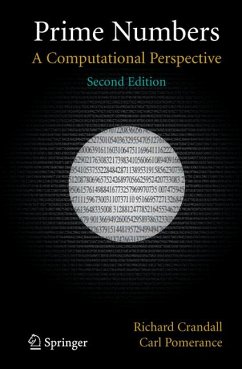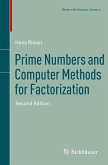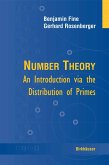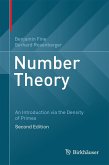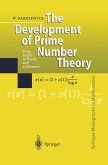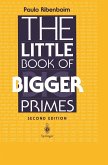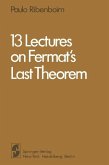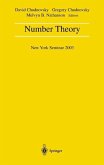Richard Crandall currently holds the title of Apple Distinguished Scientist, having previously been Apple's Chief Cryptographer, the Chief Scientist at NeXT, Inc., and recipient of the Vollum Chair of Science at Reed College. Though he publishes in quantum physics, biology, mathematics, and chemistry, and holds various engineering patents, his primary interest is interdisciplinary scientific computation. Carl Pomerance is the recipient of the Chauvenet and Conant Prizes for expository mathematical writing. He is currently a mathematics professor at Dartmouth College, having previously been at the University of Georgia and Bell Labs. A popular lecturer, he is well known for his research in computational number theory, his efforts having produced important algorithms now in use.
From the reviews of the first edition:
"Destined to become a definitive textbook conveying the most modern computational ideas about prime numbers and factoring, this book will stand as an excellent reference for this kind of computation, and thus be of interest to both educators and researchers."
^ L'Enseignement Mathématique
"...Prime Numbers is a welcome addition to the literature of number theory---comprehensive, up-to-date and written with style."
- American Scientist
"It's rare to say this of a math book, but open Prime Numbers to a random page and it's hard to put down. Crandall and Pomerance have written a terrific book."
- Bulletin of the AMS
Dieser Download kann aus rechtlichen Gründen nur mit Rechnungsadresse in A, B, BG, CY, CZ, D, DK, EW, E, FIN, F, GR, HR, H, IRL, I, LT, L, LR, M, NL, PL, P, R, S, SLO, SK ausgeliefert werden.
MATHEMATICAL REVIEWS
"There are many books about the theory of prime numbers and a few about computations concerning primes. This book bridges the gap between theoretical and computational aspects of prime numbers. It considers such matters as how to recognize primes, how to compute them, how to count them, and how to test conjectures about them¿The book is clearly written and is a pleasure to read. It is largely self-contained. A first course in number theory and some knowledge of computer algorithms should be sufficient background for reading it...Each chapter concludes with a long list of interesting exercises and research problems."
BULLETIN OF THE AMS
"The book is an excellent resource for anyone who wants to understand these algorithms, learn how to implement them, and make them go fast. It's also a lot of fun to read! It's rare to say this of a math book, but open Prime Numbers to a random page and it's hard to put down. Crandall and Pomerance have written a terrific book."
AMERICAN SCIENTIST
"...a welcome addition to the literature of number theory - comprehensive, up-to-date and written with style. It will be useful to anyone interested in algorithms dealing with the arithmetic of the integers and related computational issues."
SIAM REVIEW
"Overall, this book by Crandall and Pomerance fills a unique niche a deserves a place on the bookshelf of anyone with more than a passing interest in prime numbers. It would provide a gold mine of information and problems for a graduate class on computationl number theory."
From the reviews of the second edition:
"This book is a very successful attempt of the authors to describe the current state-of-the-art of computational number theory ... . One of the many attractive features of this book is the rich and beautiful set of exercises and research problems ... . the authors have managed to lay down their broad and deep insight in primes into this book in a very lucid and vivid way. ... The book provides excellent material for graduate and undergraduate courses on computational theory. Warmly recommended ... ." (H.J.J. te Riele, Nieuw Archief voor Wiskunde, Vol. 7 (3), 2006)
"An absolutely wonderful book! Written in a readable and enthusiastic style the authors try to share the elegance of the prime numbers with the readers ... . Weaving together a wealth of ideas and experience from theory and practice they enable the reader to have more than a glimpse into the current state of the knowledge ... . any chapter or section can be singled out for high praise. ... Indeed it is destined to become a definitive text on ... prime numbers and factoring." (Peter Shiu, Zentralblatt MATH, Vol. 1088 (14), 2006)
"This impressive book represents a comprehensive collection of the properties of prime numbers. ... in the exercises at the end of each chapter valuable hints are given how the theorems have been attained. The chapters end withresearch exercises. The book is up to date and carefully written. ... The volume is very vividly and even entertainingly written and is best suited for students and for teachers as well." (J. Schoissengeier, Monatshefte für Mathematik, Vol. 150 (1), 2007)
"The aim of this book is to bridge the gap between prime-number theory covered in many books and the relatively new area of computer experimentation and algorithms. The aim is admirably met. ... There is a comprehensive and useful list of almost 500 references including many to websites. ... This is an interesting, well-written and informative book neatly covering both the theoretical as well as the practical computational implementation of prime numbers and many related topics at first-year undergraduate level." (Ron Knott, The Mathematical Gazette, Vol. 92 (523), 2008)

